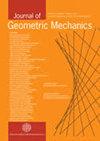Compatibility aspects of the method of phase synchronization for decoupling linear second-order differential equations
IF 1
4区 数学
Q3 MATHEMATICS, APPLIED
引用次数: 1
Abstract
The so-called method of phase synchronization has been advocated in a number of papers as a way of decoupling a system of linear second-order differential equations by a linear transformation of coordinates and velocities. This is a rather unusual approach because velocity-dependent transformations in general do not preserve the second-order character of differential equations. Moreover, at least in the case of linear transformations, such a velocity-dependent one defines by itself a second-order system, which need not have anything to do, in principle, with the given system or its reformulation. This aspect, and the related questions of compatibility it raises, seem to have been overlooked in the existing literature. The purpose of this paper is to clarify this issue and to suggest topics for further research in conjunction with the general theory of decoupling in a differential geometric context.解耦线性二阶微分方程相位同步方法的兼容性问题
在一些论文中,所谓的相位同步方法被认为是一种通过坐标和速度的线性变换来解耦线性二阶微分方程组的方法。这是一种相当不寻常的方法,因为与速度相关的变换通常不能保持微分方程的二阶特性。此外,至少在线性变换的情况下,这样一个速度相关的变换本身定义了一个二阶系统,原则上,它不需要与给定的系统或它的重新表述有任何关系。这方面,以及与之相关的兼容性问题,似乎在现有文献中被忽视了。本文的目的是澄清这一问题,并结合微分几何背景下的解耦一般理论提出进一步研究的主题。
本文章由计算机程序翻译,如有差异,请以英文原文为准。
求助全文
约1分钟内获得全文
求助全文
来源期刊

Journal of Geometric Mechanics
MATHEMATICS, APPLIED-PHYSICS, MATHEMATICAL
CiteScore
1.70
自引率
12.50%
发文量
23
审稿时长
>12 weeks
期刊介绍:
The Journal of Geometric Mechanics (JGM) aims to publish research articles devoted to geometric methods (in a broad sense) in mechanics and control theory, and intends to facilitate interaction between theory and applications. Advances in the following topics are welcomed by the journal:
1. Lagrangian and Hamiltonian mechanics
2. Symplectic and Poisson geometry and their applications to mechanics
3. Geometric and optimal control theory
4. Geometric and variational integration
5. Geometry of stochastic systems
6. Geometric methods in dynamical systems
7. Continuum mechanics
8. Classical field theory
9. Fluid mechanics
10. Infinite-dimensional dynamical systems
11. Quantum mechanics and quantum information theory
12. Applications in physics, technology, engineering and the biological sciences.
 求助内容:
求助内容: 应助结果提醒方式:
应助结果提醒方式:


